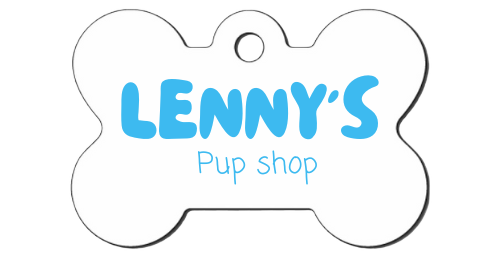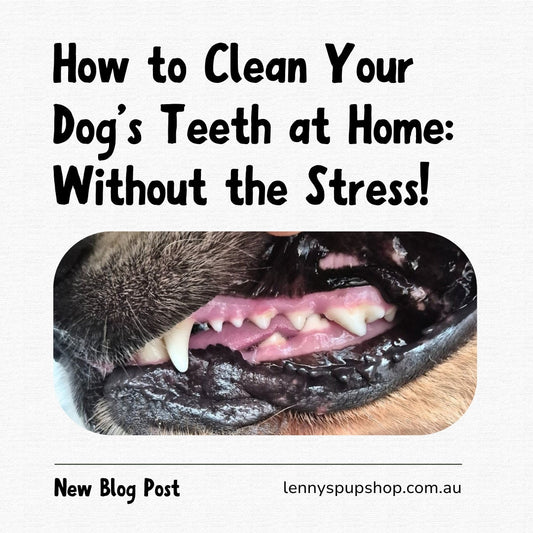The Most Common Dog Owner Mistakes – And How to Fix Them
Share
Being a dog parent is one of life’s greatest joys, but let’s be real—we all make mistakes!
Whether it’s unknowingly reinforcing bad habits or missing key aspects of care, even the most loving owners can slip up. The good news? Every mistake has a fix! Let’s dive into the most common dog owner mistakes and how you can correct them to keep your pup happy, healthy, and well-behaved.
Not Socializing Your Dog Early
The Mistake:
Many owners skip early socialisation, fearing exposure to germs before vaccinations are complete. But waiting too long can make dogs fearful of new experiences, people, and other dogs.
The Fix:
Start socializing safely by exposing your pup to different sights, sounds, and environments in controlled settings.
Arrange puppy playdates or visit dog-friendly cafes (like Lenny’s Pup Shop ).
Gradually introduce them to new people, dogs, and experiences while keeping it positive.
Using Punishment Instead of Positive Reinforcement
The Mistake:
Yelling, hitting, or punishing your dog when they misbehave can create fear, anxiety, and even aggression. Studies show that positive reinforcement is far more effective than punishment.
The Fix:
Reward good behaviour with treats, praise, or playtime.
If your dog misbehaves, redirect them instead of punishing (e.g., if they chew furniture, give them a proper chew like a Bully Stick).
Be consistent - dogs thrive on routine and clear expectations.
Overfeeding & Too Many Treats
The Mistake:
Many owners unknowingly overfeed their dogs or rely too much on poor quality treats, leading to weight gain and health issues. More than 50% of dogs in Australia are overweight!
The Fix:
Measure food portions—follow feeding guidelines based on your dog’s size, breed, and activity level.
Swap calorie-dense treats for healthier alternatives like Fish Fingers, packed with Omega-3s!
Use treats wisely—reward good behaviour but don’t overdo it.
Skipping Dental Care
The Mistake:
Neglecting your dog’s teeth can lead to plaque buildup, gum disease, and bad breath. Did you know 80% of dogs over age three have some form of dental disease?
The Fix:
Introduce dental chews like Kangaroo Teeth Cleansers to help scrape away plaque.
Brush their teeth a few times a week with dog-friendly toothpaste.
Schedule regular vet dental checkups to catch problems early.
Not Providing Enough Mental Stimulation
The Mistake:
A bored dog is a destructive dog! Many owners underestimate their dog’s need for mental enrichment, leading to behaviours like excessive barking, chewing, or digging.
The Fix:
Rotate toys and chews to keep things interesting.
Try puzzle feeders, snuffle mats, and long-lasting chews like Emu Femurs.
Daily training sessions help challenge your dog’s brain and strengthen your bond.
Ignoring Recall Training
The Mistake:
Many owners let their dogs off-leash too soon without proper recall training, leading to runaways or dangerous situations (we're guilty of this!).
The Fix:
Start in a secure area (e.g., fenced yard, quiet park) and practice recall daily.
Use high-value treats as a reward for coming when called.
Never punish your dog for returning, even if they took their time.
Assuming All Dogs Love Hugs
The Mistake:
Dogs don’t naturally enjoy hugs—while some tolerate it, others feel trapped and anxious. This can lead to stress or even defensive biting.
The Fix:
Eespect your dog’s space—watch their body language.
Instead of hugs, show affection through belly rubs, ear scratches, or playtime.
Teach children proper ways to interact with dogs to prevent stress or fear.
Final Woof: Mistakes Happen—Just Learn & Grow!
Nobody’s perfect but being aware of these common mistakes can help you become a better dog parent. Small changes—like swapping punishment for rewards, keeping training consistent, and providing mental stimulation—can make a huge difference in your pup’s happiness and well-being.
Want to give your dog the best?
Check out our all-natural treats & chews to reward good behaviour while keeping them healthy and happy!



